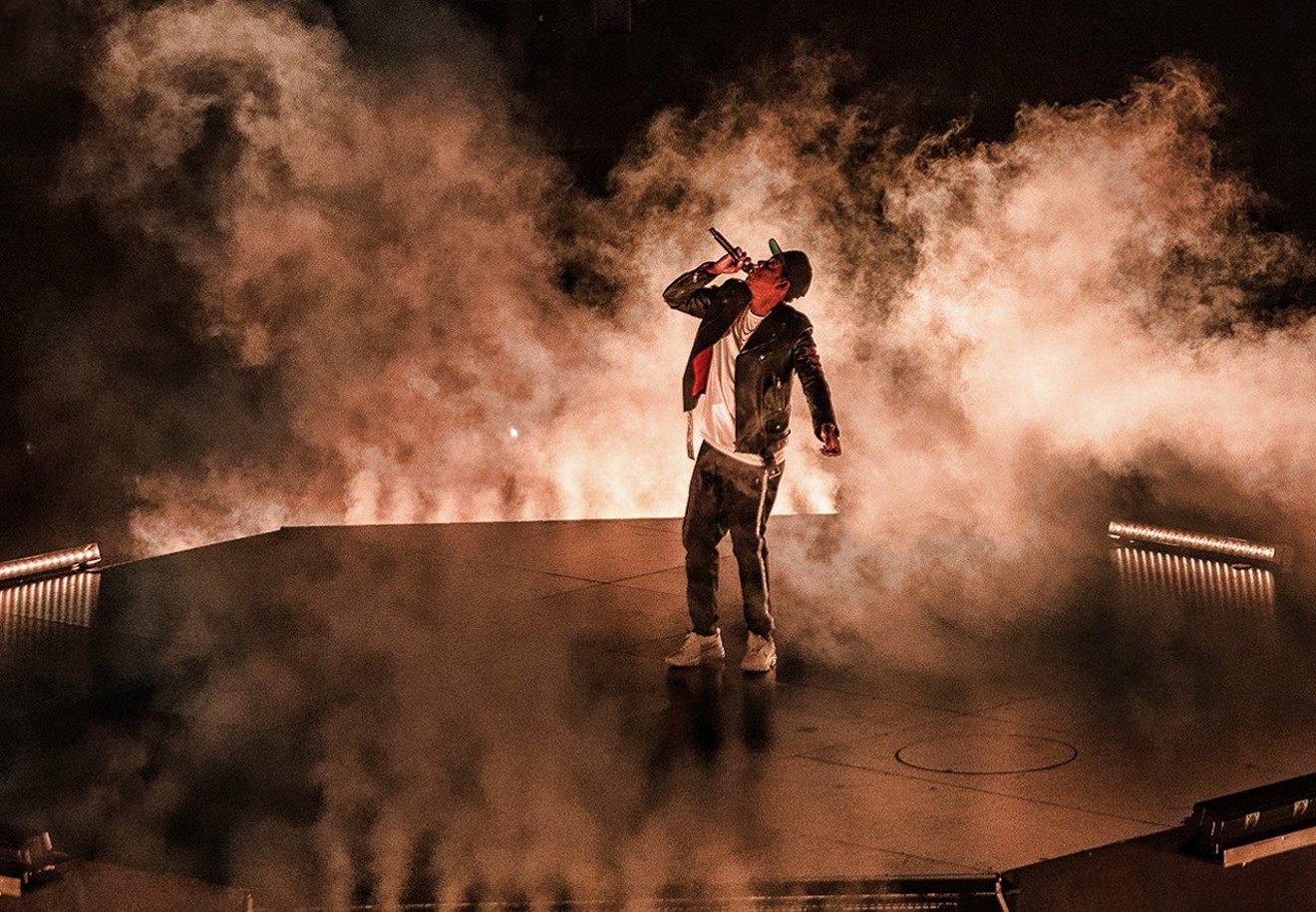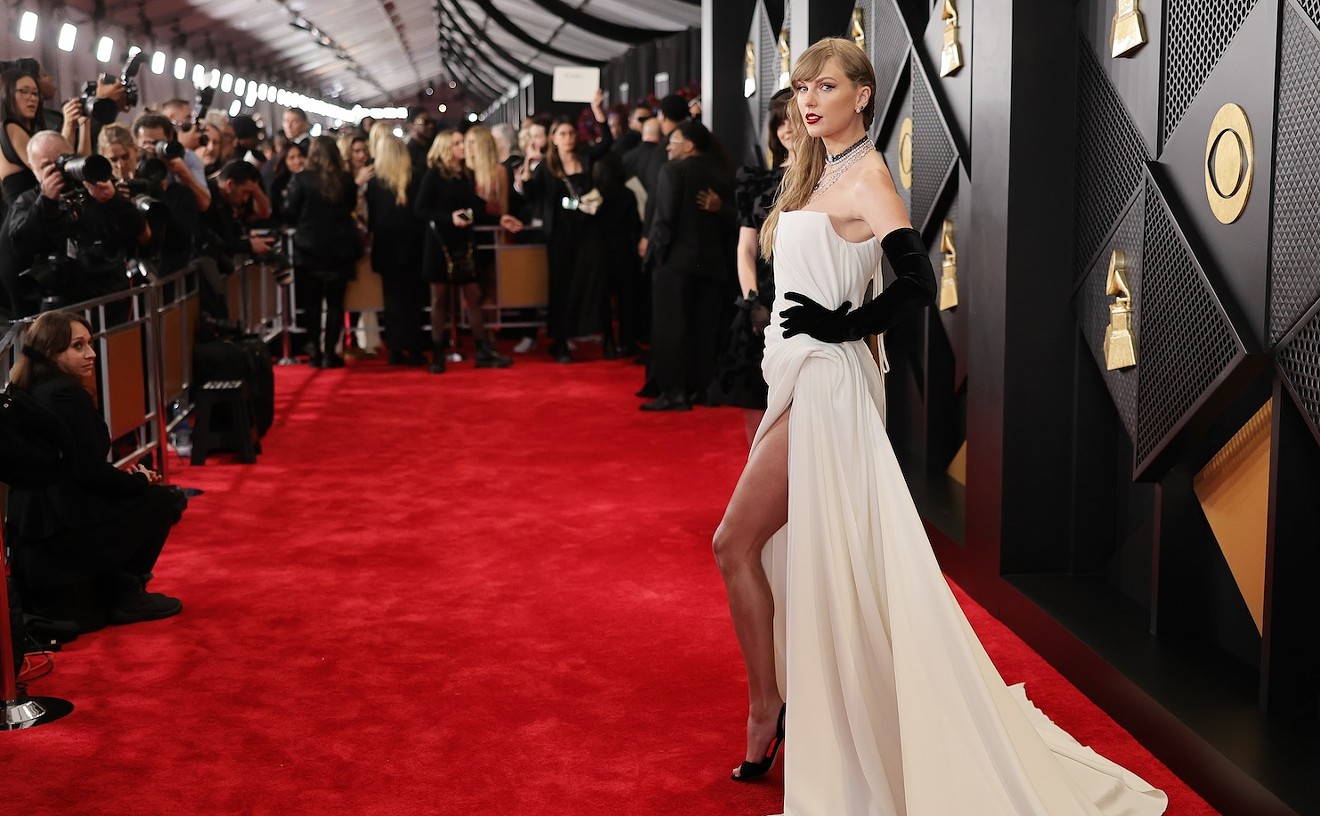Vicious traffic, nightmarish parking, long security lines, crappy weather — there were plenty of hurdles to clear Sunday night to get to American Airlines Arena, but they were worth the trouble to see the one and only Jay-Z.
This was the weekend for big events in Miami, and just as fans came out in numbers for the Hurricanes football game Saturday night against Notre Dame, they showed up for Mr. Carter.
A good chunk of NYC did too, as heavy Brooklyn accents permeated the cool night air. They included street hustlers hawking bootleg tour shirts and scalping tickets to fans decked out in Yankee ball caps.
The opener, Chicago rapper Vic Mensa, was a happy surprise, showing he could not only rap and sing but also inspire. "More black men in chains today than during the Emancipation Proclamation,” he quipped.
Mensa promoted a petition to restore ex-convicts' voting rights. It wasn’t the only call for social activism during the evening, but certainly the most practical.
There was a grand sense of occasion, and with good reason. Aside from the fact that the marquee and tickets said “Jay-Z,” the impressive stage setup looked as if it was built by long-dead gods and hinted at big things to come. The octagon stage could very well have been the setting for an MMA title fight, and Jay-Z was back to reclaim his belt.
For this Las Vegas-worthy matchup, it was Jay-Z versus, uh, himself?
If there was one thing his latest album, 4:44, taught us, it was that Jay-Z has deconstructed himself, stripping away layers of bullshit to get to the heart of who he is as a man. His concert this past weekend reflected that fact visually and structurally.
Opening with “Kill Jay-Z,” the show strung four sets of screens in V shapes around the stage. During the opening montage, onscreen photos of Jigga’s face erupted into slow-burning flames that began at his eyes until the fire consumed everything. Standing in the middle of it all was Jay-Z, who rose on an elevated stage that was like an onyx pyramid emerging from the steaming center of the Earth.
He wore a jacket that read “Blind for Love,” and after performing “No Church in the Wild,” he wasted no time proclaiming that “love always trumps hate.” Much like 4:44, Jay-Z’s philosophies as of late could be interpreted as being directed at both himself and our society, two deeply flawed phenomena.
Between “Lucifer,” “Heart of the City,” and “Run This Town,” all performed in quick succession, Jay-Z had the energy of the room switched on straight away. The crowd happily did its part on multiple sing-alongs, hitting all the cues perfectly.
It must be said that a good rap concert is very difficult to pull off. But this was Jay-Z. One thing he understands is that it isn’t just about the man on the stage. The music has to bump and bump hard. His live band was incredible, and everything was turned up to 11.
As for his MC skills, neither his age nor his rich-business-mogul status has softened his delivery one bit. He’s as razor-sharp as ever, and to a certain extent, he’s trying harder than ever.
There’s absolutely a part of Jay-Z that feels he needs to prove something. Case in point: When it was time for the title track, “4:44,” Hova said, “This is the most uncomfortable song I ever recorded.” The track is essentially an apology letter he wrote to his wife Beyoncé for his marital infidelity.
Standing center stage, no longer Jay-Z, his jacket off, spotlight on, Shawn Carter shed his bravado, and like a soul singer crooning about heartbreak, he delivered the lines, “I apologize,” over and over again, seemingly meaning it every time.
Does he feel guilt every time he performs this song in public? Only he knows, but his penance must be made easier when crowds are paying him millions of dollars to watch him endure it. It was here that an important transition took place. Under the cover of the screens, which had been lowered, a montage of video clips jumped back and forth between images of his best friend Kanye West and images of Beyoncé at their wedding. Jay-Z transformed.
When the curtain was lifted, he had his jacket back on, signaling a shift in mood. Shawn Carter had stepped aside, and Jay-Z, invincible in his armor of self-assuredness, had returned. The pyramid lowered so he could be closer to the people, his people. Though Jay-Z is alone in his shame, he’s very much not alone in his success.
This was the old-school-hits portion of the show: “Jigga My Nigga,” “Izzo (H.O.V.A.),” “Dirt Off Your Shoulder,” “On to the Next One,” and “I Just Wanna Love U (Give It 2 Me).” The Miami Hurricanes had gotten their swagger back against Notre Dame the previous night, and Jay-Z spent the next 20 minutes proving he never lost it.
It seemed as though once he got the hard shit out of the way, his self-inflicted burden lifted, he was free, if only temporarily, to rollick and rumble through the most exalted moments of his career.
Appropriately enough, this is where Jay-Z chose to insert “Family Feud,” his most confident 4:44 song, with lines such as “Ain't no such thing as an ugly billionaire/I'm cute.”
“99 Problems” and "Big Pimpin’” rounded out the meat of this section. The interplay between his classic cuts and the more reflective tracks off the new LP were like the powerful muscles of a body connected by the more fragile ligaments, all working in perfect harmony. The emotional outbursts balanced the more physical jams.
After one last intermission, accompanied by images of calming ocean waves and fathers strolling with their children on a beach, Jay-Z returned once more, this time sporting a jacket that simply read, “Loved.”
With “The Story of O.J.,” perhaps one of Shawn Carter’s most important songs, a song dedicated to “anyone who’s ever been discriminated against,” he began bringing the show full circle. “It’s not about a flag,” he said. “It’s about justice and injustice.” This was Jay-Z at his most exuberant and most encouraging, urging African-Americans to “get our shit together.”
He followed with “Niggas in Paris,” a very clear message of accomplishing what he always dreamed of, not letting his background (growing up in the projects) or his skin color deter or defeat him.
By the time he made his final lap around the octagon, occupying all of that stage space with his Madison Square Garden-size personality, Jay-Z fulfilled the promise of big things to come. This show was both about him and not about him. It was about the greatness imperfect people can achieve when they confront their demons from within and without — and how to turn it all into one gigantic party.
[
{
"name": "Air - MediumRectangle - Inline Content - Mobile Display Size",
"component": "19274298",
"insertPoint": "2",
"requiredCountToDisplay": "2"
},{
"name": "Editor Picks",
"component": "17482312",
"insertPoint": "4",
"requiredCountToDisplay": "1"
},{
"name": "Inline Links",
"component": "18711090",
"insertPoint": "8th",
"startingPoint": 8,
"requiredCountToDisplay": "7",
"maxInsertions": 25
},{
"name": "Air - MediumRectangle - Combo - Inline Content",
"component": "17482310",
"insertPoint": "8th",
"startingPoint": 8,
"requiredCountToDisplay": "7",
"maxInsertions": 25
},{
"name": "Inline Links",
"component": "18711090",
"insertPoint": "8th",
"startingPoint": 12,
"requiredCountToDisplay": "11",
"maxInsertions": 25
},{
"name": "Air - Leaderboard Tower - Combo - Inline Content",
"component": "17482313",
"insertPoint": "8th",
"startingPoint": 12,
"requiredCountToDisplay": "11",
"maxInsertions": 25
}
]













